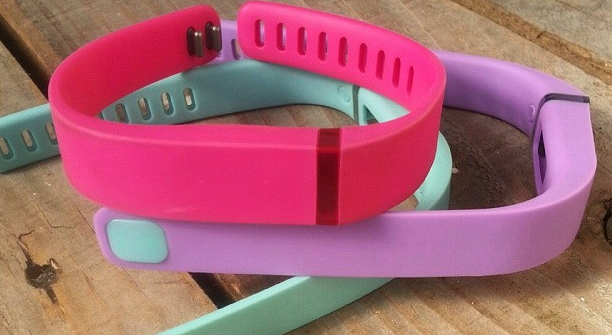Pharmaceutical Companies Using Fitness Trackers To Collect Data On Drug Trials, Other Research

Pharmaceutical companies and medical researchers are turning to fitness trackers – like the Fitbit – to gather more precise data on the effects of medications.
(Kim Moyse)
Consumers looking to improve their health have turned to fitness trackers like Fitbit, Jawbone, Vivofit, and Fuse that record the user’s heart rate, calories burned, steps walked, and other pertinent data. These devices are also increasingly being used for another purpose: tracking the effectiveness of new medications in drug trials and other research for pharmaceutical companies.
Bloomberg reports that the gadgets have become a critical tool for medical researchers and drug makers vying to understand and bring drugs to the market faster.
By strapping fitness trackers on trial participants, companies have been able to streamline research and collect more precise data about their products.
“The use of wearables has the potential to be a revolution,” Kara Dennis, managing director of mobile health at Medidata Solutions Inc., which consults with companies on ways to improve clinical trials, tells Bloomberg.
To date, the National Institutes of Health reports there have been at least 299 clinical trials using wearable technology to track the effects of drugs on participants.
In one specific case, GlaxoSmithKline followed the movements of 25 patients with the muscular neurodegenerative condition Lou Gehrig’s disease, or ALS.
Under the trial, the participants were given a small, rectangular monitor that sticks to their chests to measure heart rate, walking steps and elevation gain.
The data collected from the device – which is made by Finnish medical technology company Mega Electronics Ltd. – is sent to Glaxo on a secure server to be used in research for potential treatments of the disease.
Bloomberg reports that the Department of Veterans Affairs is gearing up to run a clinical trial using similar wearables to monitor veterans with back pain.
While the agency hasn’t chosen a specific tracker for the trial, they plan to record the veterans’ steps and use the information – along with patients’ personal pain assessments – to better personalize treatment plans.
Tech companies specializing in wearable technologies have taken notice of the medical field’s use of such products, even working to develop new devices for better monitoring, Bloomberg reports.
MC10 Inc. created a device called the “biostamp,” modeled after a Band-Aid but equipped with flexible sensors and circuits. While the device isn’t currently being used in trials, executives with the tech company say they have partnered with several pharmaceutical companies with other trackers.
Big Pharma Hands Out Fitbits to Collect Better Personal Data [Bloomberg]
Want more consumer news? Visit our parent organization, Consumer Reports, for the latest on scams, recalls, and other consumer issues.

